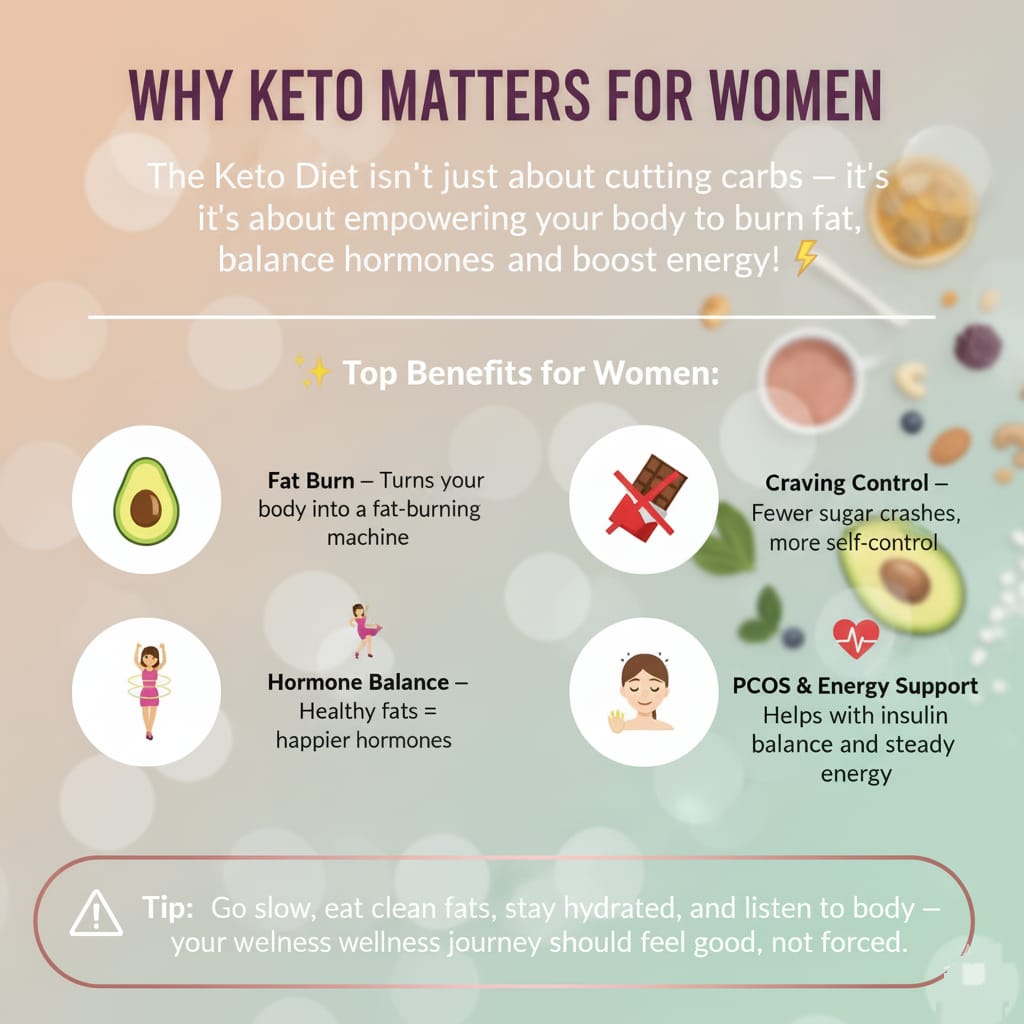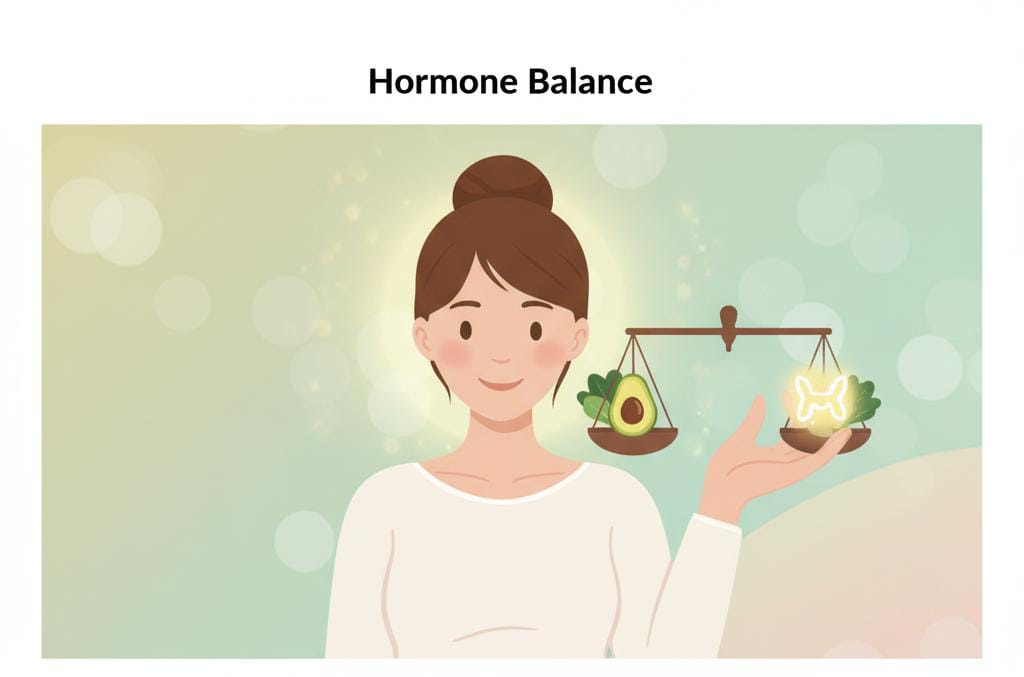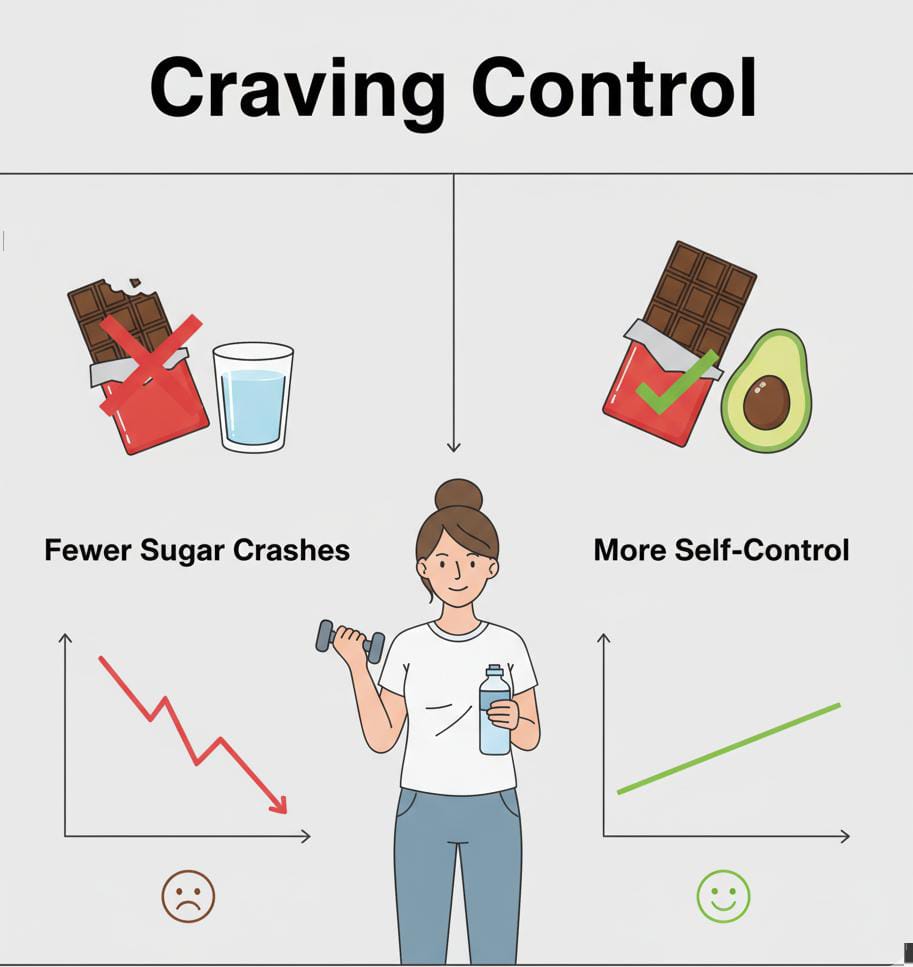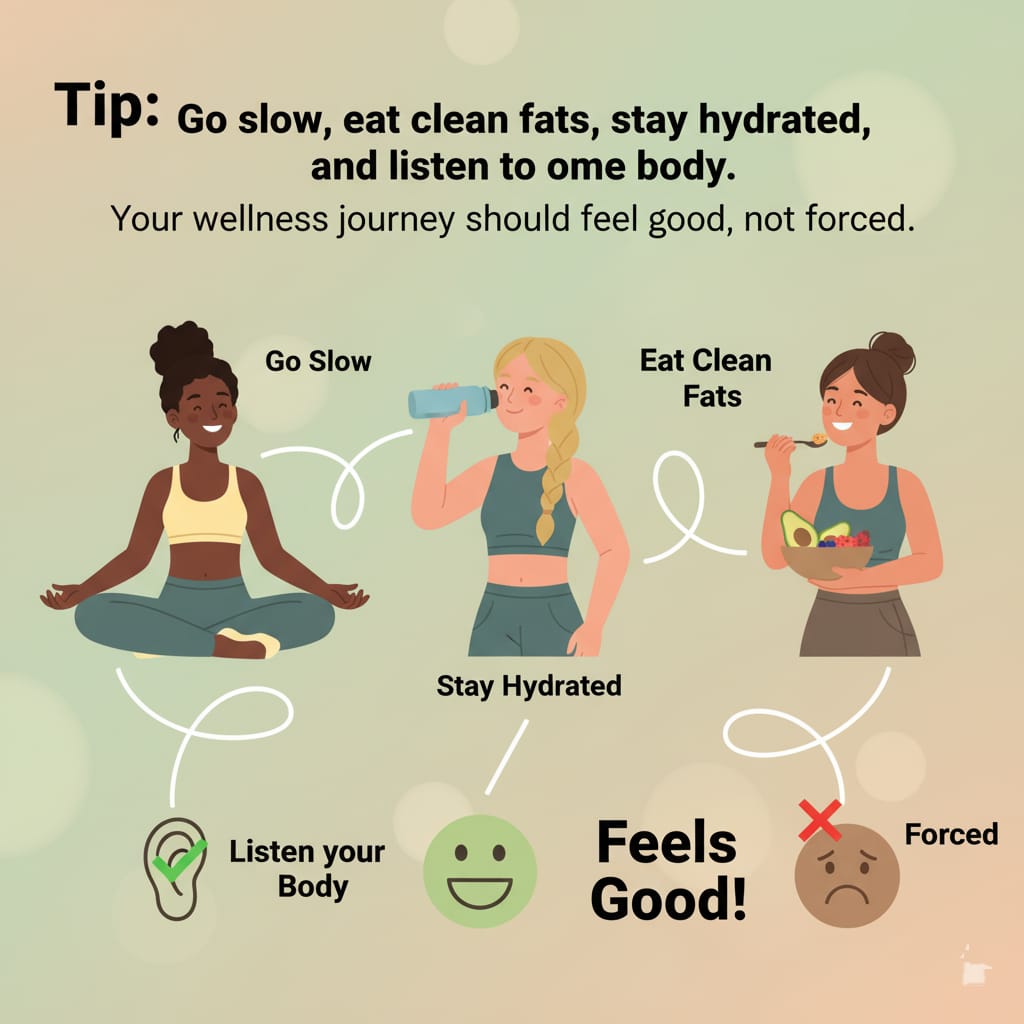
Introduction
Welcome to a transformative journey designed especially for women. The keto diet for women offers more than just weight loss — it’s a powerful, science-informed approach that can support hormonal balance, sharpen mental clarity, regulate cravings, improve skin health, and support conditions like PCOS while sustaining steady energy.
In this article, we present 7 empowering insights into how the keto diet for women can change both your body and mind. Each section delves deeply into one major benefit, backed by research, practical tips, and real-world applications. Throughout, we’ll use the phrase keto diet for women to help you internalize its meaning and purpose. At the end, you’ll also find detailed cautions and safety guidelines to follow as you move forward.

1) 🥑 Fat Burn — How the Keto Diet for Women Turns Your Body into a Fat-Burning Machine

At the heart of the keto diet for women lies a metabolic shift: when carbohydrate intake is greatly reduced, the body increases ketone production and pivots toward burning stored fat for fuel. In nutritional ketosis, the liver converts fatty acids into ketone bodies (β-hydroxybutyrate, acetoacetate), which can supply energy to organs and tissues — including the brain — in place of glucose.
Because insulin promotes fat storage and suppresses fat breakdown, lower insulin levels under a ketogenic regime facilitate lipolysis (the release of stored fat). For women following the keto diet for women, this metabolic shift helps mobilize triglycerides from adipose tissue, enabling sustained body-fat loss over time. Clinical studies and meta-analyses show that ketogenic diets often produce more rapid early fat loss compared to conventional lower-fat diets, especially in the first 8 to 24 weeks.
However, women face some unique considerations. Differences in baseline muscle mass, hormonal fluctuations, and reproductive systems mean that overly aggressive calorie deficits or extremely low protein can jeopardize lean tissue or disrupt menstrual cycles. In the context of the keto diet for women, preserving muscle via resistance training and ensuring adequate protein (often in the range of 1.0–1.4 g/kg body weight, individualized) is critical. Tracking body composition — not just scale weight — helps distinguish true fat loss versus water or lean mass changes.
Practical tips for fat burning on the keto diet for women:
- Focus on whole, nutrient-dense foods (fatty fish, eggs, avocados, nuts, olive oil) rather than processed “keto” packaged snacks.
- Incorporate regular resistance workouts to stimulate muscle maintenance and metabolic health.
- Use moderate caloric deficits instead of extreme restriction, to avoid hormonal disruption.
- Monitor your progress via body fat measures or bioimpedance, rather than relying solely on scale changes.
- Be patient: the initial drop may include water weight, but sustained fat loss improves over months.
In sum, the keto diet for women supports a metabolic environment conducive to fat oxidation — but success depends on preserving lean mass, meeting nutrient needs, and avoiding overly harsh deficits.
2) 💃 Hormone Balance — How Keto Supports Healthier Hormones in Women

For women, hormonal balance is central to overall health — affecting mood, fertility, energy, and metabolic function. The keto diet for women can play a supportive role here by improving insulin dynamics and supplying the necessary fat substrates needed for producing steroid hormones.
Dietary fats, including cholesterol and fatty acids, are building blocks for hormones such as estrogen, progesterone, and testosterone. When fats are reduced too much or replaced with processed oils, hormonal production can be impaired. By contrast, the keto diet for women—when well designed—emphasizes healthy fats (e.g. monounsaturated and polyunsaturated fats, omega-3s) which support cellular membranes, signaling, and hormone production.
Moreover, insulin is a powerful modulator of reproductive hormones. Chronic high insulin (insulin resistance) can drive excess androgen production in the ovaries, disrupt menstrual cycles, and impair ovulation. Many women with hormonal imbalances (such as PCOS) respond well to insulin-lowering dietary strategies. The keto diet for women often reduces post-meal glucose spikes, lowers fasting insulin, and improves insulin sensitivity — thus easing the hormonal burden and rebalancing androgen levels, LH/FSH ratio, and overall reproductive hormone homeostasis.
Still, there is nuance: rapid weight loss or very low caloric intake may suppress thyroid hormone production or elevate stress hormones (like cortisol), potentially undermining hormonal balance. Women on the keto diet for women should avoid highly restrictive plans and focus on a nutrient-dense, sustainable approach.
Best practices to support hormone balance on keto:
- Include a variety of healthy fat sources (e.g. olive oil, fatty fish, nuts, avocados).
- Monitor menstrual cycles, mood, and energy; if cycles change drastically or stop, reassess calorie and macro balance.
- Get baseline hormone labs (thyroid, reproductive hormones, insulin) before starting and recheck after a few months.
- Pair dietary changes with stress management, sleep optimization, and regular strength training.
- Work with clinicians if you have endocrine disorders or hormone therapy.
The keto diet for women can empower hormonal harmony — particularly by improving insulin action and supplying essential fats — but it must be managed carefully to avoid unintended endocrine disruption.
3) 🧠 Sharper Focus — Ketones as Brain Fuel in the Keto Diet for Women

One of the most celebrated but less well understood perks of the keto diet for women is cognitive enhancement. Ketone bodies (especially β-hydroxybutyrate) are efficient and stable fuels for the brain. In contrast to glucose, which fluctuates with meals and insulin, ketones provide a constant energy source that may improve mental clarity, concentration, and resistance to “brain fog.”
Research into ketogenic and exogenous ketone therapies, mostly in aging or disease contexts, has shown improvements in mitochondrial efficiency, reduced oxidative stress, stimulation of neuroprotective signaling pathways (e.g., BDNF), and decreased neuroinflammation. Although much of this research lies outside healthy populations, the mechanisms are promising. In healthy individuals — including women following a well-formulated keto diet — many report fewer energy crashes, more consistent mental performance, and improved focus during demanding tasks.
During the adaptation period (the first days or weeks), some women may experience transient side effects such as irritability, mental fog, or fatigue, often referred to as “the keto flu.” This reflects the brain adjusting from glucose to ketone metabolism. With proper hydration, electrolyte balance, and a gradual transition, many adapt and regain mental clarity.
Tips to support cognitive gains on keto:
- Use medium-chain triglycerides (MCTs) or a small amount of MCT oil to raise ketone levels, especially around high-focus periods.
- Maintain electrolyte balance (especially sodium, potassium, magnesium) to support nerve function and avoid cognitive dips.
- Ensure adequate sleep and manage stress, because brain performance depends on rest.
- If focus remains poor beyond adaptation, reassess carb intake, macronutrients, or nutrient sufficiency (B vitamins, omega-3s, etc.).
In effect, the keto diet for women can bring more consistent, sharper mental performance — provided adaptation is handled well and diet supports brain health.
4) 🍫 Craving Control — How Keto Helps Women Reduce Sugar Cravings and Regulate Appetite

Many women struggle with sugar cravings, emotional snacking, or sudden hunger spikes. The keto diet for women often helps break those cycles. By stabilizing blood sugar levels, reducing post-meal insulin surges, and supplying sustained satiety from fats and protein, ketogenic eating can dampen the urge for sweets and frequent snacking.
At the hormonal level, appetite regulators like ghrelin (“hunger hormone”) and leptin interact with metabolic signals. Some research suggests ketosis may blunt ghrelin spikes and moderate leptin signaling, though long-term hormone data are mixed and likely influenced by energy balance and body composition changes. Regardless, many users report that cravings fade and hunger becomes more predictable on the keto diet for women, allowing better control over food choices and portions.
This effect is especially beneficial for women who struggle with emotional eating or hormonal appetite swings (e.g., premenstrual craving surges). By tempering blood sugar peaks and reducing reward-driven eating behaviors, the keto diet for women gives more psychological breathing room to choose nourishing foods and maintain consistency.
However, caution is needed. In women of reproductive age, overly aggressive appetite suppression or too low calorie intake can harm menstrual regularity or turn hunger regulation into disordered eating. For that reason, while craving control is a major advantage of the keto diet for women, it should always be balanced with nourishment and mindful eating.
Practical strategies:
- Prioritize fiber-rich, low-carb vegetables and adequate protein to support satiety.
- Minimize processed “keto snack” foods that trigger reward circuits.
- Monitor your appetite cues: if hunger disappears to the point of neglecting meals, reassess calories.
- Use gentle refeed days or higher-carb windows if needed to reset appetite and maintain sustainability.
When applied sensibly, the keto diet for women offers a powerful tool to regain control over cravings and appetite — making long-term adherence more feasible.
5) 💆♀️ Clearer Skin & Mood — The Anti-Inflammatory Potential of the Keto Diet for Women

Skin and mood are windows into our internal milieu. Inflammation, insulin spikes, oxidative stress, and micronutrient insufficiencies can worsen skin conditions like acne, rosacea, or eczema, and also influence mood disorders. The keto diet for women reduces glycemic load and systemic insulin peaks, which can dampen pro-inflammatory signaling, improve oxidative balance, and reduce hormonal triggers of skin flares.
Emerging pilot studies and mechanistic evidence support the idea that lower carbohydrate intake reduces inflammatory cytokines and stabilizes insulin, both beneficial for acne and inflammatory dermatoses. Women often note visible improvements in complexion, less breakouts, or reduced redness after several weeks on a well-formulated ketogenic plan.
Regarding mood, stable blood sugar and reduced inflammatory cytokines in the brain may improve emotional regulation, reduce irritability, lessen mood swings, and ease anxiety or low energy tied to sugar crashes. Ketone bodies themselves may modulate neuroinflammation and support neurotransmitter balance, offering another potential route to mood stabilization. Nevertheless, during the adaptation phase, some people may temporarily experience fatigue, mood dips, or irritability until their system adjusts.
Tips for skin and mood benefits:
- Choose anti-inflammatory fats (omega-3 fish, olive oil, nuts) and include green leafy vegetables.
- Ensure nutrients critical to skin and neurotransmitter health (zinc, biotin, B vitamins, vitamin D).
- Avoid overrestriction—adequate calories and nutrients support mental stability.
- If skin or mood issues persist or worsen, consult dermatologists or mental health professionals; diet helps but may not replace medical treatment.
When done right, the keto diet for women not only supports clearer, healthier skin but also steadier moods — creating a positive feedback loop of wellness.
6) 💗 PCOS & Energy Support — How the Keto Diet for Women Helps Insulin Balance and Sustains Energy

Polycystic ovary syndrome (PCOS) affects many women and is frequently associated with insulin resistance, irregular cycles, and androgen excess. For women with PCOS, the keto diet for women offers a targeted strategy: by limiting carbohydrate load and stabilizing insulin levels, ketogenic nutrition can reduce hyperinsulinemia, decrease androgen production, improve ovulatory regularity, and support fertility in some cases. Several small trials and observational studies have documented improved metabolic profiles (fasting insulin, HOMA-IR), lowered androgen levels, and resumed menses in women with PCOS following low-carbohydrate or ketogenic protocols.
Energy-wise, many women on the keto diet for women report steadier, more sustained energy throughout the day. Because ketosis helps avoid the peaks and troughs of post-meal glucose surges and crashes, fewer energy dips occur. For individuals with PCOS who often experience fatigue, brain fog, or sluggishness tied to insulin surges, the normalized blood sugar environment of keto can translate into better endurance and consistent mental clarity.
That said, women with PCOS present heterogeneously: those with pronounced insulin resistance often respond more strongly, while lean PCOS phenotypes may respond differently. Strict ketogenic diets can be hard to maintain, so some women fare better with more flexible low-glycemic or cyclical carbohydrate strategies. Clinical collaboration ensures individualized carbohydrate targets, metabolic monitoring, and safe medication adjustments.
Practical guidance for PCOS and energy support:
- Begin with baseline metabolic and reproductive labs and recheck after 2–3 months of dietary adjustment.
- Tailor carbohydrate limits to your personal tolerance and lifestyle; all guaranteed zero-carb is not always better.
- Combine with exercise (resistance + cardio) to enhance insulin sensitivity.
- Monitor signs of overtraining, fatigue, or hormonal disruption, and adjust diet accordingly.
In summary, the keto diet for women provides a robust metabolic environment ideal for managing PCOS and supporting sustained energy, especially when applied judiciously and under supervision.
7) (Optional) — Long-Term Maintenance, Flexibility & Adaptivity
While the above six benefits are often the most celebrated, a seventh insight is that the keto diet for women needs sustainable flexibility. Over time, many women adopt variations such as “cyclical keto,” “targeted keto,” or a more moderate low-carb approach to maintain hormonal health, social flexibility, and nutrient adequacy. The ability to adapt and reintroduce carbohydrates cautiously — while preserving metabolic gains — is a strength, not a failure.
Smart adherents often cycle carbohydrate intake around workouts, use occasional refeed days, or gradually shift to a less-strict low-carb plan once core goals are reached. This adaptive approach helps protect long-term bone health, reproductive balance, and metabolic resilience while preserving many benefits of ketosis.
⚠️ Detailed Cautions & Safety Notes for the Keto Diet for Women
While the keto diet for women offers numerous benefits — from fat-burning and hormone balance to improved energy and focus — it’s equally important to understand the potential risks and safety considerations. Every woman’s body is unique, and factors like hormonal cycles, metabolic rate, and health conditions play a big role in how the body responds to ketosis. Below are detailed cautions to keep in mind before and during a keto journey:
👶 1. Pregnancy & Breastfeeding
Strict or prolonged ketosis is generally not advised during pregnancy or lactation without medical supervision. During these stages, the body has increased nutritional demands for fetal growth and milk production. A carb-restricted diet may affect energy availability, nutrient transfer, and milk composition. Pregnant or nursing women should aim for a moderate-carb, nutrient-dense variation of keto and consult their healthcare provider before starting.
🩸 2. Menstrual Irregularities
Some women may experience menstrual disruptions such as delayed periods, lighter flow, or amenorrhea (absence of menstruation) after starting keto. This often occurs due to a sudden calorie deficit, rapid fat loss, or inadequate nutrient intake, which can influence reproductive hormones like estrogen and progesterone. If this happens, it’s important to reassess calorie intake, increase healthy fats, and ensure adequate micronutrients. Restoring balance often normalizes the cycle over time.
🦴 3. Bone & Mineral Health
The long-term keto diet may reduce intake of key minerals and vitamins essential for bone strength and metabolic function, including calcium, magnesium, potassium, vitamin D, and B vitamins. Without careful planning, this can increase the risk of bone density loss, fatigue, or muscle weakness. To prevent this, women should include mineral-rich foods (leafy greens, seeds, avocados, dairy, fortified products) and consider supplementation under professional guidance.
❤️ 4. Lipid Profile & Heart Health
While many women experience improved triglyceride and HDL levels on keto, some may notice a rise in LDL cholesterol or total cholesterol due to high intake of saturated fats. It’s essential to choose healthy fats such as olive oil, avocado, nuts, seeds, and fatty fish rather than relying heavily on butter or processed meats. Regular lipid panel monitoring and consultation with a doctor can help ensure cardiovascular health remains optimal.
⚡ 5. Adaptation Symptoms & Electrolyte Balance
During the early stages of ketosis, many women experience the so-called “keto flu” — symptoms like headaches, fatigue, dizziness, and muscle cramps. These effects usually stem from electrolyte imbalance and dehydration as glycogen stores deplete. Combat this by staying well-hydrated, adding sodium, magnesium, and potassium-rich foods (like bone broth, avocado, spinach, and nuts), and avoiding extreme calorie restriction.
💊 6. Medication Interactions
The keto diet can significantly impact blood sugar levels and blood pressure, especially in individuals taking medications for diabetes, hypertension, or cholesterol. This may necessitate dose adjustments or close medical monitoring to avoid complications such as hypoglycemia or hypotension. Always start keto under the supervision of a qualified healthcare provider if you’re on prescription medications.
💭 7. Psychological Well-being & Sustainability
For some women, strict dietary rules or rapid results can lead to stress, anxiety, or disordered eating patterns. A rigid keto plan may feel isolating or mentally draining over time. To maintain long-term success, focus on a balanced, flexible approach — occasionally include healthy carb sources, practice mindful eating, and avoid guilt over small deviations. The goal is to build a sustainable lifestyle, not a temporary restriction.
🌿 Final Word
The keto diet for women can be empowering when approached mindfully — but it’s not one-size-fits-all. Listening to your body, staying nourished, monitoring health markers, and maintaining balance are key to long-term wellness. Always consult a healthcare professional before making significant dietary changes, especially if you have underlying medical conditions or specific hormonal concerns.

Conclusion
The keto diet for women offers powerful benefits: enhanced fat burn, hormonal support, sharper cognition, craving control, clearer skin and mood, and metabolic support especially in PCOS. But the key to success lies in individualized planning, adequate nutrition, and attentive monitoring.
Ready to Start Your Keto Journey the Right Way?
You don’t have to figure it all out alone! 🌟
Unlock your full potential with my Free Keto Starter Toolkit — packed with meal planner, grocery checklists, and easy-to-follow guides created.
👉 Explore a variety of mouthwatering keto recipes, wellness blogs, and expert tips designed to help you stay consistent, confident, and inspired on your journey.
✨ Whether your goal is to burn fat, balance hormones, or simply feel your best — your transformation begins today!
🔗 Get Your Free Keto Toolkit Now at www.ketoquickmeals.com
Certified Keto Diet Specialist & Culinary Expert
Momina is a dedicated Keto nutritionist with over 5 years of experience in low-carb lifestyle coaching. At KetoQuickMeals.com, she focuses on making the Ketogenic diet accessible and delicious for everyone. Her recipes are scientifically balanced to ensure maximum health benefits and weight loss efficiency.
Disclaimer: The content on KetoQuickMeals.com is for informational and educational purposes only and is not intended as medical advice or to replace a relationship with a qualified healthcare professional. Always consult your physician before starting any new diet.

